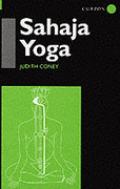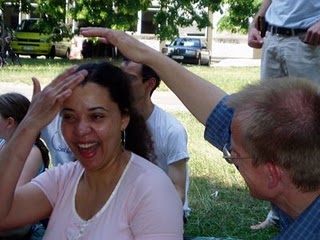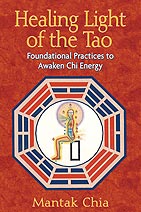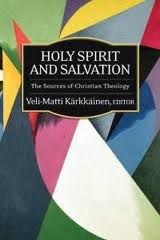![]()
"This book is my attempt, as a sociologist of religion, to answer the question raised by my friend that day.”

"One spring afternoon in 1992, a Norwegian friend who was living in my village for a year whilst he completed a Master of Business Administration at Bath University dropped over for coffee. After exchanging the usual set of pleasantries about the weather and a few comments about the local primary school, he introduced a new topic into the conversation. Knowing my interest in new religions, he said, was I aware that some people in the next village were 'giving cool breezes'? I confessed my ignorance and pressed him for details. One, a woman called Jane, he continued, had given him a sort of massage and as a result he had felt a Cool Breeze on the top of his head. 'I really did, you know!' he went on, looking slightly uncomfortable, as he did not quite believe it himself. 'What's it all about?'
This book is my attempt, as a sociologist of religion, to answer the question raised by my friend that day. It is about Sahaja Yoga, the new religious movement (NRM) whose member was responsible for the 'cool breezes' which he felt.”
Judith Coney, Sahaja Yoga (Introduction page)
Publisher: RoutledgeCurzon; 1 edition (May 24 1999)
Judith Coney is a lecturer in the Department of Study of Religions at the School of Oriental and African Studies, University of London.

Feeling the Cool Wind of the Spirit for very first time!
Since the 1970's hundreds of thousands, like the Bath
University undergraduate given Self-realization ('being
born of the Holy Spirit', or baptism) at Sahaja Yoga public
programs, have felt the Cool Breeze (pneuma).* This
experience confirms the spiritual rebirth that Jesus Christ
declared is absolutely required to enter the Kingdom of
God. For those accepting the Good News and taking part
in the Resurrection, this Divine Wind (Ruach, Qi, Prana,
Riah Al-Qiyamah, Pneuma) will flow 24/7 for the rest of
their lives, and are empowered to trigger the same
spiritual rebirth in others too! (*YouTube 4:20 mins.) Jesus answered and said unto him, 'Verily, verily I say to you, except a man born be born again, he cannot see the Kingdom of God'. Nicodemus said to him, 'How can a man be born again when he is old? Can he enter the second time into his mother's womb, and be born?' Jesus answered, 'Verily, verily, I say to you, except a man born of water and the Spirit, he cannot enter into the Kingdom of God. That which is born of flesh is flesh and that which is born of Spirit is spirit. Marvel not that I say to you: 'You must be born again.' The wind blows where it pleases, and you hear its sound, but cannot tell where it comes from and where it is going: So it is with everyone born of the Spirit.”- John 3:3-8

"The idea of chi is not unique to the Chinese. Nearly every culture in the world has a word to express this concept. Dr. John Mann and Larry Short, authors of The Body of Light, count forty-nine cultures around the world that articulate the concept of chi in one form or another.
In Hebrew, the word is ruach, and it appears in the first chapter of the Book of genesis:
In the beginning God created the Heaven and the Earth. The world was without form and void, and darkness was upon the face of the deep; and the ruach [spirit, wind, or breath] of God was moving over the face of the waters. Genesis 1:1-2
Ruach was present at the creation of the universe, even before light. The term means 'breath of God' or 'divine breath.'
In Japanese, the term ki expands the concept of chi to include the Chinese idea of yi, or intention, indicating that our mind or will is a major influence governing the movement of chi, which is very important in meditation and in the martial arts.
In Sanskrit, the word for chi is prana. The Tibetan word is lung. In Lakota Sioux it is known as neyatoneyah. The Bush People of the Kalahari speak of it as num, which means 'boiling energy.' In the Islamic world chi is referred to as barraka. Although many cultures possess an awareness of chi, the Chinese have refined the concept and integrated it into their culture to an unparalleled degree. Chi is a pivotal factor in Chinese medicine, martial arts, meditation, science, painting, calligraphy, architecture, interior design, and poetry.”
Mantak Chia, Healing Light of the Tao
Inner Tradition (Jun 6 2008) pp. 32-33

"In Christianity the Spirit is God permeating God's own creation. According to the creation study in the Hebrew Scriptures, 'a wind [spirit] from God swept over the face of the waters' in the beginning of creation (Gen. 1:2).... Hence, the primary mission of the Spirit has to do with life, creating it, sustaining it and directing it towards its future destiny. The Spirit is the source of life, not only of the present life but of eternal life as well. The Spirit is within creation, but is not conditioned by creation.
Chinese theologians Chang Chun-shen and C. S. Song suggest that this Spirit is what the Chinese would call qi—air, breath and spirit. According to the teachings of Confucianism and Taoism, qi is the material origin of all things; it is at the same time the origin of the life-force and energy moving into action. Or rather it is in itself equipped with life-giving properties and energy for action. The following is a standard expression of qi:
Ch'i [qi] fills the space between heaven and earth. Heaven and earth themselves, all things between heaven and earth, are all constituted by ch'i. Because of ch'i everything between heaven and earth moves, changes, and functions. It itself moves and moves all things. It is the subject of changes and movements and the origin that causes them. Human beings and animal-plant life also consists of ch'i...
The qi must have something to do with the pneuma mention by Jesus. 'The pneuma [air, wind or spirit] blows where it chooses, and you hear the sound of it, but you do not know where it comes from or where it goes' (Jn. 3:8). This is the mystery of pneuma and qi. It is wind as well as spirit. It moves and work like wind, blowing where it wills. This actually is similar to the Old Testament concepts of 'soul' and 'breath,' ...”
Veli-Matti Karkkainen, Holy Spirit and Salvation
Westminster John Knox Press (August 16, 2010) , p. 435

The Paraclete Shri Mataji “This is exactly what happened to the disciples of Christ when they were blessed by the Holy Ghost: the Cool Breeze came on them, they started speaking in strange languages. And the same thing you'll find with Sahaja Yogis that they speak in a strange language in the sense that they talk in the language of the centres, and they start using their hands in a way because the hand has got the power flowing, and they use it to bind it up and that looks very strange. And at that time (of Jesus Christ) also it looked very strange so people started saying that they are mad people, they are doing some sort of funny actions.”
The Paraclete Shri Mataji
Public Program, "The Knowledge of the Roots"
Cardiff, UK—August 8, 1984
"In 14:26, Jesus says, 'But the Paraclete, the Holy Spirit, whom the Father will send in my name, will teach you all things and will remind you of all that I myself spoke to you.' (14:26). The teaching ministry of the Paraclete is presented as superior to that of Jesus because the Paraclete will teach them 'll things' and will remind them of 'everything' that Jesus said (14:26). The Paraclete's ministry is set clearly in the future. Jesus again identifies this 'Paraclete' with the Holy Spirit, whom the disciples would know from the Old Testament (Ps. 51:11; Is. 63:10,11): 'But the Paraclete, the Holy Spirit—the Father will send in My name' (14:26). This sending will fulfill Old Testament promises as well as Jesus' request (14:16). The sending of the Paraclete in Jesus' name not only links the sending to Jesus' request but also supports the claim that the Paraclete comes to continue Jesus' ministry.” (Hamilton 2006, 79)
"it's the living power that does it. So as a result of this awakening within us, a new awakening, you become one with that Divine Power, which is All Pervading, which we call as the Cool Breeze of the Holy Ghost. We start feeling, actually, in our fingers, the Cool Breeze, and also from our head, a Cool Breeze coming up. We can do all kinds of manipulation like jumping, dancing, but we can't take out Cool Breeze from our head, can we? This is real baptism. This is what was said, that you are to be born again, not just by taking a certificate that you are born again.”
The Paraclete Shri Mataji
Public Program, Rome, Italy—September 8, 1983
"Ruach means two things, closely linked to one another: wind and breath. This is true also of the Greek name Pneuma and the Latin Spiritus. English also has words from the root spirit, like inspire and respire, and from the root pneuma, like pneumatic, and all of these retain the link with breath and blow. This same link is present in the term ghost, which, like the German geist, derives from gast, breath.
And so it is that wind and breath are more than just symbols of the Holy Spirit. Here we have symbol and reality so closely linked that they share the same name. it is difficult for us to grasp the influence of the fact that wherever we read 'wind' in the Scripture, people of biblical times also understood 'spirit,' and wherever we read 'spirit,' they also understood 'wind.'" (Cantalamessa 2003, 9)
"And He said it very clearly to Nicodemus that 'You have to be born again' when he asked, 'm I to enter back into my mother's womb?' And He said it so clearly. Those who don't want to see can remain blind. No, that is, whatever is born of the flesh, is the flesh, but whatever is born of the Spirit is the Spirit.
But whatever is manmade is not the Spirit. This is the clear statement of Christ, which people wanted to avoid, and start their own organisations, and ideas, and created a very mythical thing in His name. And now the time has come for it to be blasted. It has been going on and on now for thousands of years, captures so many innocent people and people are into it.”
The Paraclete Shri Mataji
Easter Puja, London, UK—April 22, 1984
"In 3.1-12, Nicodemus is portrayed as a benighted man, seeking out Jesus but finding him distant and incomprehensible. Nicodemus, as representative of all 'earthly' brokers, cannot conceive of a spiritual birth that somehow lies out of human control. All such brokers are bested in challenge and response by Jesus, as he is shown to be the only one suited to mediate between God and humanity.
At this point, now that we have a clearer view of its context within the Nicodemus narrative, we can attempt to ascertain the meaning and significance of 'spirit' in our passage. Jesus' directive that one must be 'born of spirit' in order to enter the kingdom of God proves intriguing. It means that spiritual birth somehow facilitates access to God's kingdom. One must become a person of spirit, rather than merely a person of flesh, before one can participate in the patronage of God. Apparently, spiritual birth qualifies one to receive the benefits of divine patronage, most importantly eternal life.” (Brown 2004, 214)
"And we enter into the kingdom of God, which is the limbic area in the medical terminology. But from here you have to pierce through; and this piercing through is the destination, is the destination through which you have to come out, and is placed at the fontanel bone area where you get your baptism. But baptism, as I told you yesterday, is just an artificial exercise. Actual baptism is when this Holy Ghost rises and you start really feeling the Cool Breeze on top of your head. This is a miracle. It is!"
The Paraclete Shri Mataji
Public Program, Bath, UK—August 7, 1984
"One of the chief features of the primitive Christian understanding of the Spirit is that the gift of the pneuma is an eschatological gift and its working in the community is an eschatological event. The Spirit's work on believers is not just an external, invisible, and incomprehensible field of force. The Spirit is given to them as a gift. Here lies the special nature of its function relative to the salvation event. The gift of the Spirit has a soteriological function as an anticipation of the eschatological outpouring of the Spirit and is defined as a gift by the fact that Jesus Christ has given it to believers, the eschatological future of salvation having dawned already in his own person and history, so that he or she is aware that the Spirit he or she has received is the Spirit of Jesus Christ (Phil 1:19; cf. Rom 8:9).” (Varkey 2011 Kindle 5840)
Disclaimer: This non-profit site contains copyrighted material the use of which has not always been specifically authorized by the copyright owner. We are making such material available to our readers under the education and research provisions of "fair use" in an effort to advance a better comprehension of controversial religious, spiritual and inter-faith issues. If you wish to use copyrighted material for purposes other than "fair use" you must request permission from the copyright owner.